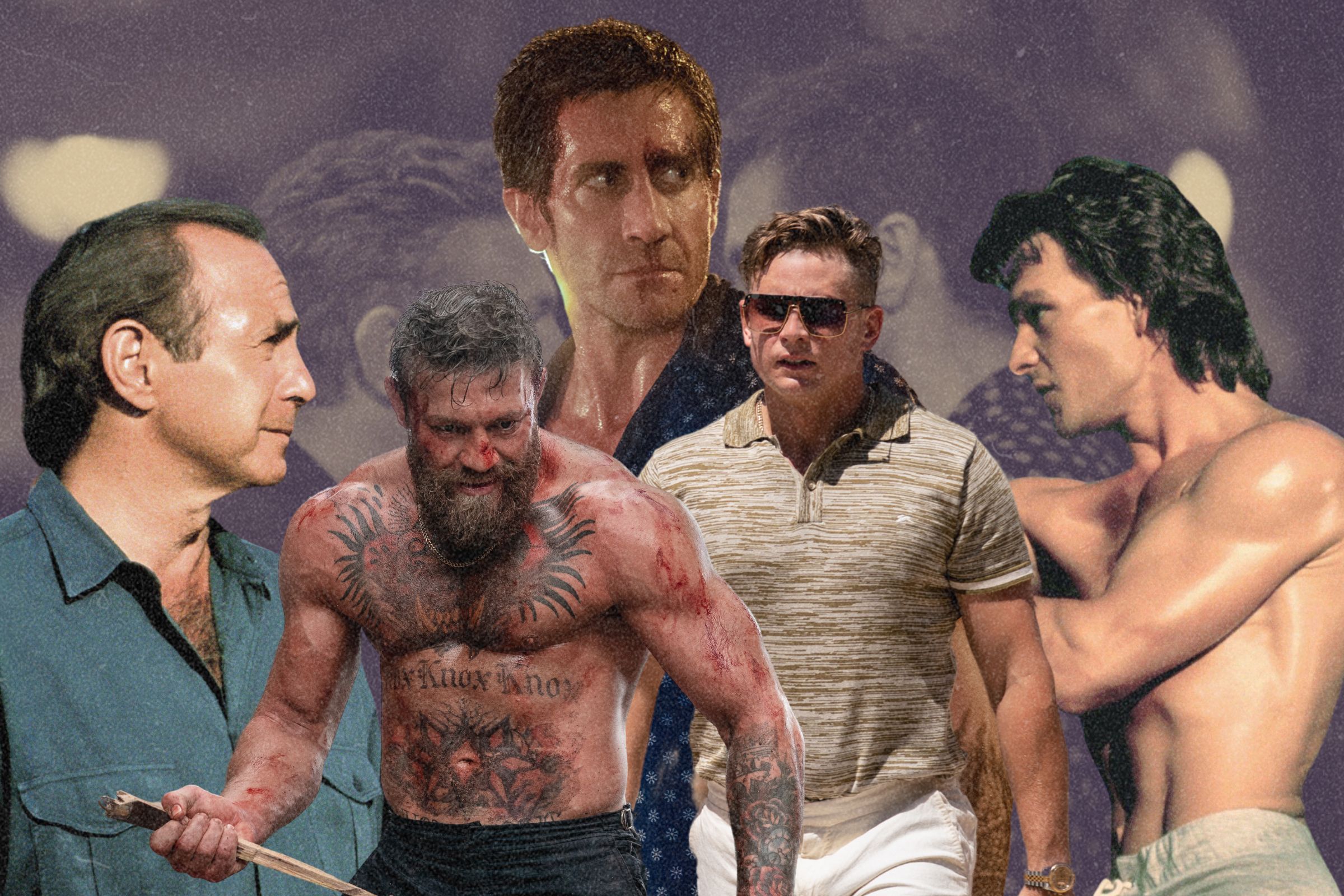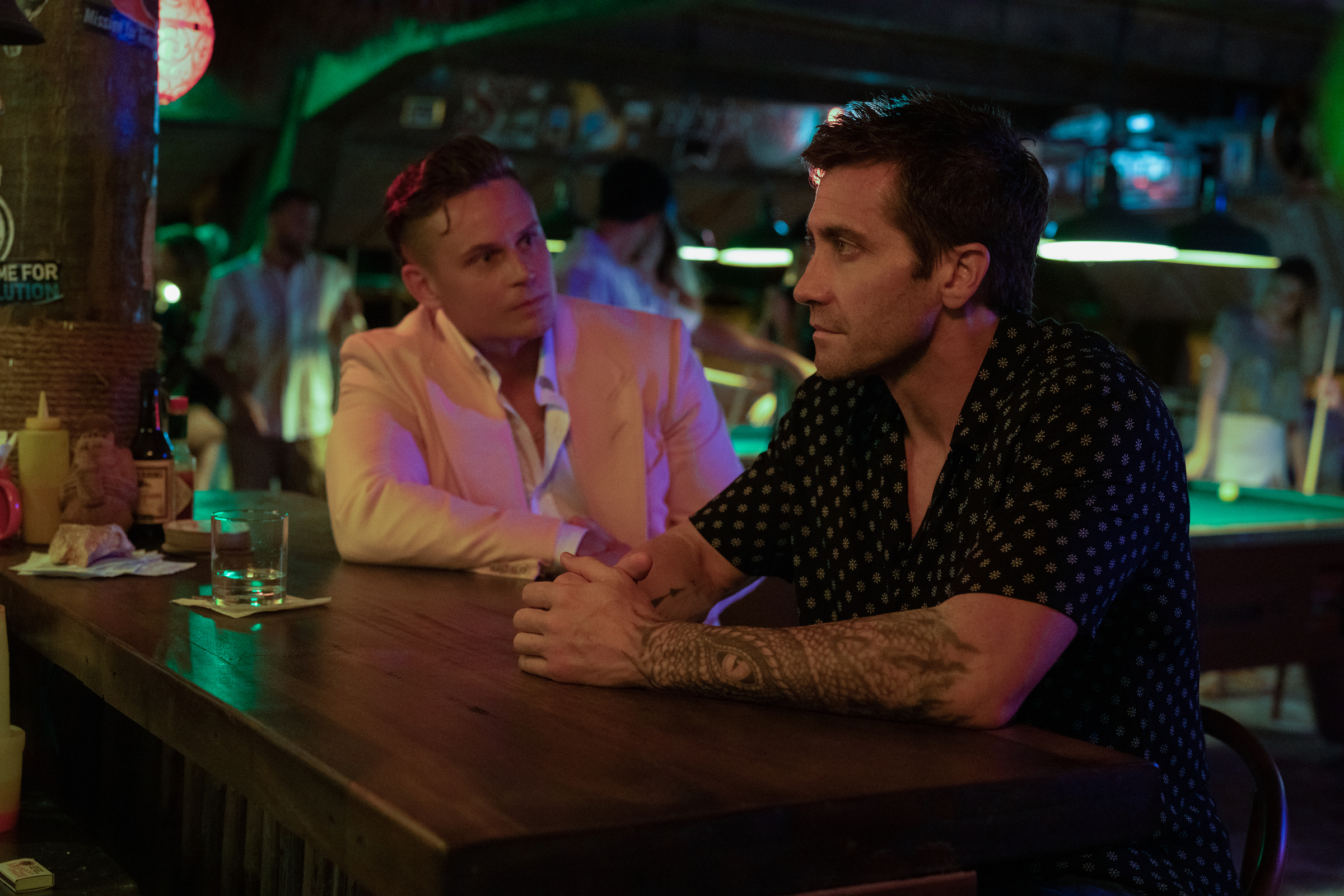
A remake is a delicate thing. Call them reboots, reimaginings, or anything else you’d like: Under any name, they’re powerfully tempting, whether for filmmakers eager to pay homage to the movies that made them, studios out to exploit handy IP, or fans hoping for another hit of something they already know they love. Whether a reboot succeeds often has to do with whether those groups feel there’s some element of the original that needs to be corrected in some way.
So what happens when you remake a movie that’s already in the “best of all time” conversation—even if the thing it’s best at is being a bad movie?
“Road House is the story of one bouncer’s quest to free a small town from the iron fist of the guy who is on the verge of opening the area’s first JC Penney. Over half a dozen men will die for this.” When you’ve literally written the book on Road House, the 1989 Patrick Swayze cult classic action extravaganza, you get pretty good at summarizing its bizarre, beer-sluggin’ appeal, and that’s my best attempt. In this action landmark, Swayze plays Dalton, a “cooler” (head bouncer in charge) with a philosophy degree from NYU and a new gig at a Missouri hellhole. Ben Gazzara (of The Big Lebowski and the original Broadway production of Cat on a Hot Tin Roof fame) plays the real-estate developer and organized crime boss out to stop him from cleaning up the joint. The rest is B-movie history.
Directed by (I kid you not) Rowdy Herrington and shepherded to life by super-producer Joel Silver, the original Road House has a bad reputation, one that it frankly deserves. The high concept—a man so good at bouncing that he’s literally famous in bars across the nation—is ludicrous. The mixed cast of non-traditional performers and legitimately brilliant character actors—pro wrestler Terry Funk, Los Angeles punk legend John Doe, and member of Elvis’s Memphis Mafia Red West on one hand; John Cassavetes repertory player Gazzara and grizzled Western icon Sam Elliott on the other—leads to dialogue that must be heard to be believed. Little of that dialogue, suffice it to say, can be reprinted here.
But Road House is known as the best bad movie of all time because of the considerable chops involved in making it. Romantic leads Swayze and Kelly Lynch were coming in hot off sexy performances in the smash hits Dirty Dancing and Cocktail, and they look every inch the babes they’re supposed to be. Swayze in particular is a fascinating casting choice for the role, bringing his trained dancer’s physicality to the ass-kicking contest and winning over and over again. Lynch is one of the few humans alive at the time who could hold up her end of a nude scene with a Swayze in that condition. Elliott, meanwhile, has had every woman I know who’s watched this movie reacting like a wolf in a Tex Avery cartoon.
Read More: Jake Gyllenhaal’s Road House Remake Crackles With Glorious, Unruly Energy
And the action is extraordinary, by any measure. Extraordinarily stupid, sure, in that it involves a lot of drunken yokels being socked in the jaw and tossed through tables. But cinematographer Dean Cundey (Jurassic Park, Back to the Future) and editors John F. Link (Die Hard, Predator) and Frank J. Uribe (RoboCop, Basic Instinct) made it a work of art. The battles between Dalton and his bouncers on one end and Brad Wesley’s goons on the other are near-constant and always impactful. Dalton’s climactic mano a mano with lead goon Jimmy—choreographed in large part by Swayze and his scene partner Marshall Teague themselves—is one of the greatest fight scenes ever filmed, full stop. There’s real movie magic going on here.
In the years since its release, Road House became the most basic of basic cable pleasures. A perpetual fixture of weekend afternoon timeslots on commercial cable networks that air movies for dudes, it won over a generation with its neo-western vibe, its assortment of colorful (read: weird) characters, and its unceasing onslaught of people getting struck in the head. Not even the censorship of the film’s colorful language and gratuitous nudity, male and female alike, kept it from achieving this life after theatrical death.
Along the way, cult comedy icons like the Mystery Science Theater 3000 crew and Clerks director Kevin Smith sang the movie’s praises. Kelly Lynch started telling a well-received anecdote about how Bill Murray and his brothers call her husband any time they catch her big sex scene in the movie on cable. And a growing legion of fans discovered you can’t find its unique blend of sturdy construction and cockamamie content anywhere else.

So when Amazon announced plans for director Doug Liman—an action-filmmaking expert with Go, Mr. & Mrs. Smith, and the Bourne franchise on his resume—to helm a remake starring Jake Gyllenhaal in the Swayze role, the reaction from certain cinephile quarters was as if someone decided to take a crack at Citizen Kane. How could anyone hope to recapture the goofy glory of the original?
Turns out you can’t—and that’s exactly the strength of the new film, out on Prime Video on March 21. Liman, Gyllenhaal, and company recognize that what made the original Road House so delightfully stupid won’t quite work in 2024. Their version ends up being a sweet-natured, hilarious, and, of course, psychotically violent tribute to an unlikely masterpiece, and the creators’ affection for the original article shines through in every frame.
As the new Dalton, Gyllenhaal embodies the Swayze character’s faux-zen credo—“Be nice…until it’s time to not be nice”—without cribbing the line outright. He’s polite to a fault, asking an assortment of creeps about their insurance coverage and proximity to the nearest hospital before beating the tar out of them—this is the source of much of the film’s droll (yes, droll) sense of humor. Billy Magnussen shines as the Gazzara-style villain, a flop-sweating, smarmy scion of a rich criminal who comes across like a long-lost Trump son. The goons include Arturo Castro (Broad City) as a strangely friendly member of a hostile biker gang and UFC fighter Conor McGregor, never without a smile and frequently without pants, in the “non-traditional actor” role once occupied by Funk, Doe, and company.
Liman’s Road House doesn’t quite reach the original movie's level of silliness. But he can outdo it in violence. Liman takes the viewer into Dalton’s quest—on a mission to save a Black-owned business in the Florida Keys from a drug-dealing hyper capitalist swine—using hard-to-pin-down CGI to seemingly weld the camera to the bodies of the combatants in its many fight scenes. Dalton throws a punch, and the camera travels with his fist. Someone gets tossed across a bar, and the camera gets tossed too.
Meanwhile, the new Dalton—a disgraced UFC fighter rather than a world-famous bouncer—punches people in the head in undisguised closeups that, even once seen, can barely be believed. Computer trickery is involved for sure, but even so, if you’ve seen enough fights to know what CTE is, this is nightmarish stuff. It’s awesome.
So is Road House—both the 1989 and 2024 versions. Without trying to mimic the spirit of the original, Liman, Gyllenhaal, and their team have successfully updated it. The new Road House is a movie anyone could proudly guzzle a couple of beers and watch on a lazy Saturday afternoon. For this franchise, that’s as high as praise gets.
More Must-Reads from TIME
- Why Biden Dropped Out
- Ukraine’s Plan to Survive Trump
- The Rise of a New Kind of Parenting Guru
- The Chaos and Commotion of the RNC in Photos
- Why We All Have a Stake in Twisters’ Success
- 8 Eating Habits That Actually Improve Your Sleep
- Welcome to the Noah Lyles Olympics
- Get Our Paris Olympics Newsletter in Your Inbox
Contact us at letters@time.com